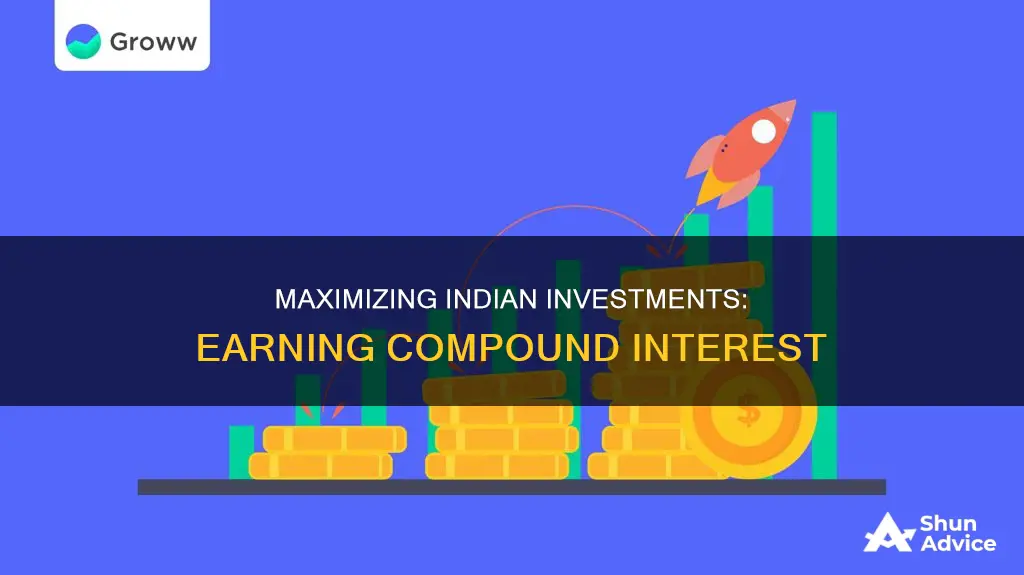
There are a number of ways to earn compound interest on an investment in India. Compound interest investment options are often designed for long-term investment horizons, such as retirement funds or long-term savings plans. Systematic Investment Plans (SIPs) in mutual funds offer compound interest, as do fixed deposits (FDs) and savings accounts. The reinvestment of interest is a key feature of compound interest investment options, allowing for exponential growth of your investment over time.
| Characteristics | Values |
|---|---|
| Investment type | Systematic Investment Plans (SIPs), fixed deposits, savings accounts, money market accounts, bonds, stocks, equity mutual funds, real estate investment trusts (REITs), retirement funds, long-term savings plans |
| Interest reinvestment | Allowed |
| Returns | Higher than simple interest investments over time |
| Investment horizon | Long-term |
| Tax | Depends on the type of investment option and tax regulations |
What You'll Learn

Systematic Investment Plans (SIPs) in mutual funds
SIPs are a type of mutual fund where you invest a fixed amount at regular intervals, such as monthly or quarterly. The money is then invested in a diversified portfolio of stocks, bonds, and other securities. SIPs are a popular investment option in India because they offer the potential for high returns with relatively low risk. They are also flexible, as you can usually choose how much to invest and how often.
One of the key benefits of SIPs is that they allow you to benefit from rupee-cost averaging. This means that you buy more units when the price is low and fewer units when the price is high, which helps to reduce the overall cost of your investment. SIPs are also a good option if you don't have a large amount of money to invest upfront, as you can start with a small amount and increase your investments over time.
Another advantage of SIPs is that they offer the potential for higher returns than simple interest investments. Due to the compounding effect, compound interest investments can generate higher returns over time. As the interest earned is reinvested, it generates additional interest, leading to the exponential growth of your investment. Compound interest works best when investments are held for a long period, allowing the compounding effect to maximise your returns.
It's important to note that compound interest investments are taxed differently depending on the type of investment and tax regulations in effect. For example, interest paid on a public provident fund (PPF) is tax-free, while interest earned on fixed deposits (FDs) is subject to tax based on the individual's income tax bracket. Capital gains tax may also apply to equity investments, so it's important to consider the tax implications when choosing an investment option.
Maximizing Investment Loan Interest Claims: A Comprehensive Guide
You may want to see also

Fixed deposits (FDs)
Interest earned on fixed deposits is subject to tax based on the individual's income tax bracket. This is different to other compound interest investments, such as the public provident fund (PPF), where interest paid is tax-free.
Fixed deposits are a good option for those looking for a long-term investment horizon, as compound interest works best when investments are held for a long period. This allows the compounding effect to take place, resulting in exponential growth of your investment over time. Due to the compounding effect, compound interest investment options can generate higher returns over time than simple interest investments.
While fixed deposits are a good option for those looking for a long-term, low-risk investment, equities or stocks offer the potential for the highest returns in India, albeit with higher risk compared to other investment options.
Investment Interest Expenses: Are They Taxable?
You may want to see also

Reinvesting interest earned
Compound interest investment options typically allow for the reinvestment of interest earned. This means that the interest earned on your initial investment is reinvested into your funds, allowing it to earn additional interest in subsequent periods. This compounding effect can result in exponential growth of your investment over time. Due to the compounding effect, compound interest investment options can generate higher returns over time than simple interest investments. As the interest earned is reinvested, it generates additional interest, leading to the exponential growth of your investment over time.
Compound interest works best when investments are held for a long period, allowing the compounding effect to work its magic. Compound interest investment options are often designed for long-term investment horizons, such as retirement funds or long-term savings plans.
Most Systematic Investment Plans (SIPs) in mutual funds offer compound interest. When you invest regularly, your earlier investments start earning returns, and subsequent investments are added to the growing corpus. This leads to the power of compounding over time. Almost all banks in India offer compound interest on savings accounts and fixed deposits. However, interest rates vary across banks, so it's essential to compare options before choosing.
You can also enjoy the benefit of compounding by reinvesting interest or dividends earned from bonds, stocks, and real estate investment trusts (REITs). Equities or stocks offer the potential for the highest returns in India, albeit with higher risk compared to other investment options.
Interest Rate Strategies for Investment Growth
You may want to see also

Long-term investment horizons
When it comes to long-term investment horizons, compound interest can be a powerful tool to grow your wealth over time. Here are some key considerations for maximising compound interest on long-term investments in India:
Systematic Investment Plans (SIPs) in mutual funds offer compound interest and are a popular option in India. With SIPs, you invest regularly, allowing your earlier investments to start earning returns while subsequent investments are added to the growing corpus. This approach leverages the power of compounding over time. You can choose between quarterly, half-yearly, or annual compounding, which will affect the total interest earned.
Another option for long-term compound interest in India is fixed deposits (FDs). Almost all banks in India offer compound interest on FDs, and the interest is typically compounded quarterly, half-yearly, or annually. However, it's important to note that interest earned on FDs is subject to tax based on the individual's income tax bracket. Therefore, it's essential to compare interest rates and tax implications across banks before choosing an FD.
For those seeking higher returns and willing to take on more risk, equities or stocks offer the potential for the highest compound interest in India. By reinvesting the interest or dividends earned from stocks, you can further enhance the compounding effect. Similarly, real estate investment trusts (REITs) can provide compound interest through reinvestment of dividends.
Retirement funds and long-term savings plans are also designed for long-term investment horizons and can benefit from compound interest. The key to maximising compound interest is to hold your investments for an extended period, allowing the compounding effect to work its magic.
Additionally, when considering long-term compound interest investments, it's important to be mindful of tax implications. For example, interest paid on the public provident fund (PPF) is tax-free, while capital gains tax may apply to equity investments depending on the holding term and other factors.
Investing: My Journey and Interest Explained
You may want to see also

Tax implications
Compound interest investments are taxed differently depending on the type of investment option and the tax regulations in effect. For example, interest paid on the public provident fund (PPF) is tax-free. However, interest earned on fixed deposits (FDs) is subject to tax based on the individual's income tax bracket. Capital gains tax may also apply to equity investments, depending on the holding term and other variables.
When considering compound interest investment options, it is important to understand the tax implications. In India, most Systematic Investment Plans (SIPs) in mutual funds offer compound interest. This means that your earlier investments start earning returns, and subsequent investments are added to the growing corpus, leading to the power of compounding over time. However, the tax treatment of SIPs can vary. While a lump sum investment benefits from immediate compounding, allowing your entire investment to earn returns from day one, it requires a significant upfront investment.
It is worth noting that compound interest investment options are often designed for long-term investment horizons, such as retirement funds or long-term savings plans. The reinvestment of interest earned is a key feature of compound interest investment options, allowing for exponential growth of your investment over time. This reinvested interest is typically subject to tax, and the tax treatment may vary depending on the type of investment and the jurisdiction.
When choosing a compound interest investment option, it is important to consider the potential tax implications. In India, almost all banks offer compound interest on savings accounts and fixed deposits. However, interest rates can vary across banks, so it is essential to compare options before choosing. By understanding the tax treatment of different investment options, you can make informed decisions and maximise your returns.
Impact of High Interest Rates on Investment Demand
You may want to see also
Frequently asked questions
Certificates of Deposit (CDs), savings accounts, and money market accounts.
Systematic Investment Plans (SIPs) in mutual funds, fixed deposits (FDs), stocks, equity mutual funds, and bonds.
Compound interest investment options allow for the reinvestment of interest earned. This means that the interest earned on your initial investment is reinvested into your funds, allowing it to earn additional interest over time.
It depends on your financial goals and risk tolerance. Compound interest investments are typically designed for long-term investment horizons, such as retirement funds or long-term savings plans. It's important to compare interest rates and consider the tax implications of different investment options.







